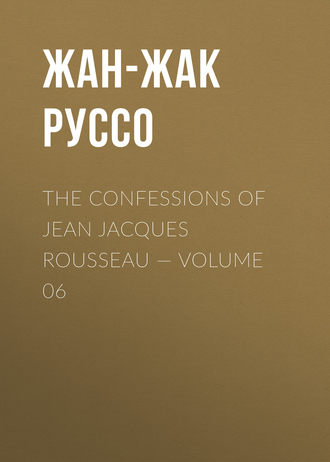
Жан-Жак Руссо
The Confessions of Jean Jacques Rousseau — Volume 06
I should like to know whether there ever passed such childish notions in the hearts of other men as sometimes do in mine. In the midst of my studies, and of a life as innocent as man could lead, notwithstanding every persuasion to the contrary, the dread of hell frequently tormented me. I asked myself, "What state am I in? Should I die at this instant, must I be damned?" According to my Jansenists the matter was indubitable, but according to my conscience it appeared quite the contrary: terrified and floating in this cruel uncertainty, I had recourse to the most laughable expedient to resolve my doubts, for which I would willingly shut up any man as a lunatic should I see him practise the same folly. One day, meditating on this melancholy subject, I exercised myself in throwing stones at the trunks of trees, with my usual dexterity, that is to say, without hitting any of them. In the height of this charming exercise, it entered my mind to make a kind of prognostic, that might calm my inquietude; I said, "I will throw this stone at the tree facing me; if I hit my mark, I will consider it as a sign of salvation; if I miss, as a token of damnation." While I said this, I threw the stone with a trembling hand and beating breast but so happily that it struck the body of the tree, which truly was not a difficult matter, for I had taken care to choose one that was very large and very near me. From that moment I never doubted my salvation: I know not on recollecting this trait, whether I ought to laugh or shudder at myself. Ye great geniuses, who surely laugh at my folly, congratulate yourselves on your superior wisdom, but insult not my unhappiness, for I swear to you that I feel it most sensibly.
These troubles, these alarms, inseparable, perhaps, from devotion, were only at intervals; in general, I was tranquil, and the impression made on my soul by the idea of approaching death, was less that of melancholy than a peaceful languor, which even had its pleasures. I have found among my old papers a kind of congratulation and exhortation which I made to myself on dying at an age when I had the courage to meet death with serenity, without having experienced any great evils, either of body or mind. How much justice was there in the thought! A preconception of what I had to suffer made me fear to live, and it seemed that I dreaded the fate which must attend my future days. I have never been so near wisdom as during this period, when I felt no great remorse for the past, nor tormenting fear for the future; the reigning sentiment of my soul being the enjoyment of the present. Serious people usually possess a lively sensuality, which makes them highly enjoy those innocent pleasures that are allowed them. Worldlings (I know not why) impute this to them as a crime: or rather, I well know the cause of this imputation, it is because they envy others the enjoyment of those simple and pure delights which they have lost the relish of. I had these inclinations, and found it charming to gratify them in security of conscience. My yet inexperienced heart gave in to all with the calm happiness of a child, or rather (if I dare use the expression) with the raptures of an angel; for in reality these pure delights are as serene as those of paradise. Dinners on the grass at Montagnole, suppers in our arbor, gathering in the fruits, the vintage, a social meeting with our neighbors; all these were so many holidays, in which Madam de Warrens took as much pleasure as myself. Solitary walks afforded yet purer pleasure, because in them our hearts expanded with greater freedom: one particularly remains in my memory; it was on a St. Louis' day, whose name Madam de Warrens bore: we set out together early and unattended, after having heard a mass at break of day in a chapel adjoining our house, from a Carmelite, who attended for that purpose. As I proposed walking over the hills opposite our dwelling, which we had not yet visited, we sent our provisions on before; the excursion being to last the whole day. Madam de Warrens, though rather corpulent, did not walk ill, and we rambled from hill to hill and wood to wood, sometimes in the sun, but oftener in the shade, resting from time to time, and regardless how the hours stole away; speaking of ourselves, of our union, of the gentleness of our fate, and offering up prayers for its duration, which were never heard. Everything conspired to augment our happiness: it had rained for several days previous to this, there was no dust, the brooks were full and rapid, a gentle breeze agitated the leaves, the air was pure, the horizon free from clouds, serenity reigned in the sky as in our hearts. Our dinner was prepared at a peasant's house, and shared with him and his family, whose benedictions we received. These poor Savoyards are the worthiest of people! After dinner we regained the shade, and while I was picking up bits of dried sticks, to boil our coffee, Madam de Warrens amused herself with herbalizing among the bushes, and with the flowers I had gathered for her in my way. She made me remark in their construction a thousand natural beauties, which greatly amused me, and which ought to have given me a taste for botany; but the time was not yet come, and my attention was arrested by too many other studies. Besides this, an idea struck me, which diverted my thoughts from flowers and plants: the situation of my mind at that moment, all that we had said or done that day, every object that had struck me, brought to my remembrance the kind of waking dream I had at Annecy seven or eight years before, and which I have given an account of in its place. The similarity was so striking that it affected me even to tears: in a transport of tenderness I embraced Madam de Warrens. "My dearest friend," said I, "this day has long since been promised me: I can see nothing beyond it: my happiness, by your means, is at its height; may it never decrease; may it continue as long as I am sensible of its value-then it can only finish with my life."
Thus happily passed my days, and the more happily as I perceived nothing that could disturb or bring them to a conclusion; not that the cause of my former uneasiness had absolutely ceased, but I saw it take another course, which I directed with my utmost care to useful objects, that the remedy might accompany the evil. Madam de Warrens naturally loved the country, and this taste did not cool while with me. By little and little she contracted a fondness for rustic employments, wished to make the most of her land, and had in that particular a knowledge which she practised with pleasure.
Not satisfied with what belonged to the house, she hired first a field, then a meadow, transferring her enterprising humor to the objects of agriculture, and instead of remaining unemployed in the house, was in the way of becoming a complete farmer. I was not greatly pleased to see this passion increase, and endeavored all I could to oppose it; for I was certain she would be deceived, and that her liberal extravagant disposition would infallibly carry her expenses beyond her profits; however, I consoled myself by thinking the produce could not be useless, and would at least help her to live. Of all the projects she could form, this appeared the least ruinous: without regarding it, therefore, in the light she did, as a profitable scheme, I considered it as a perpetual employment, which would keep her from more ruinous enterprises, and out of the reach of impostors. With this idea, I ardently wished to recover my health and strength, that I might superintend her affairs, overlook her laborers, or, rather, be the principal one myself. The exercise this naturally obliged me to take, with the relaxation it procured me from books and study, was serviceable to my health.
The winter following, Barillot returning from Italy, brought me some books; and among others, the 'Bontempi' and 'la Cartella per Musica', of Father Banchieri; these gave me a taste for the history of music and for the theoretical researches of that pleasing art. Barillot remained some time with us, and as I had been of age some months, I determined to go to Geneva the following spring, and demand my mother's inheritance, or at least that part which belonged to me, till it could be ascertained what had become of my brother. This plan was executed as it had been resolved: I went to Geneva; my father met me there, for he had occasionally visited Geneva a long time since, without its being particularly noticed, though the decree that had been pronounced against him had never been reversed; but being esteemed for his courage, and respected for his probity, the situation of his affairs was pretended to be forgotten; or perhaps, the magistrates, employed with the great project that broke out some little time after, were not willing to alarm the citizens by recalling to their memory, at an improper time, this instance of their former partiality.
I apprehended that I should meet with difficulties, on account of having changed my religion, but none occurred; the laws of Geneva being less harsh in that particular than those of Berne, where, whoever changes his religion, not only loses his freedom, but his property. My rights, however, were not disputed: but I found my patrimony, I know not how, reduced to very little, and though it was known almost to a certainty that my brother was dead, yet, as there was no legal proof, I could not lay claim to his share, which I left without regret to my father, who enjoyed it as long as he lived. No sooner were the necessary formalities adjusted, and I had received my money, some of which I expended in books, than I flew with the remainder to Madam de Warrens; my heart beat with joy during the journey, and the moment in which I gave the money into her hands, was to me a thousand times more delightful than that which gave it into mine. She received this with a simplicity common to great souls, who, doing similar actions without effort, see them without admiration; indeed it was almost all expended for my use, for it would have been employed in the same manner had it come from any other quarter.
My health was not yet re-established; I decayed visibly, was pale as death, and reduced to an absolute skeleton; the beating of my arteries was extreme, my palpitations were frequent: I was sensible of a continual oppression, and my weakness became at length so great, that I could scarcely move or step without danger of suffocation, stoop without vertigoes, or lift even the smallest weight, which reduced me to the most tormenting inaction for a man so naturally stirring as myself. It is certain my disorder was in a great measure hypochondriacal. The vapors is a malady common to people in fortunate situations: the tears I frequently shed, without reason; the lively alarms I felt on the falling of a leaf, or the fluttering of a bird; inequality of humor in the calm of a most pleasing life; lassitude which made me weary even of happiness, and carried sensibility to extravagance, were an instance of this. We are so little formed for felicity, that when the soul and body do not suffer together, they must necessarily endure separate inconveniences, the good state of the one being almost always injurious to the happiness of the other. Had all the pleasure of life courted me, my weakened frame would not have permitted the enjoyment of them, without my being able to particularize the real seat of my complaint; yet in the decline of life; after having encountered very serious and real evils, my body seemed to regain its strength, as if on purpose to encounter additional misfortunes; and, at the moment I write this, though infirm, near sixty, and overwhelmed with every kind of sorrow, I feel more ability to suffer than I ever possessed for enjoyment when in the very flower of my age, and in the bosom of real happiness.
To complete me, I had mingled a little physiology among my other readings: I set about studying anatomy, and considering the multitude, movement, and wonderful construction of the various parts that composed the human machine; my apprehensions were instantly increased, I expected to feel mine deranged twenty times a day, and far from being surprised to find myself dying, was astonished that I yet existed! I could not read the description of any malady without thinking it mine, and, had I not been already indisposed, I am certain I should have become so from this study. Finding in every disease symptoms similar to mine, I fancied I had them all, and, at length, gained one more troublesome than any I yet suffered, which I had thought myself delivered from; this was, a violent inclination to seek a cure; which it is very difficult to suppress, when once a person begins reading physical books. By searching, reflecting, and comparing, I became persuaded that the foundation of my complaint was a polypus at the heart, and Doctor Salomon appeared to coincide with the idea. Reasonably this opinion should have confirmed my former resolution of considering myself past cure; this, however, was not the case; on the contrary; I exerted every power of my understanding in search of a remedy for a polypus, resolving to undertake this marvellous cure.
In a journey which Anet had made to Montpelier, to see the physical garden there, and visit Monsieur Sauvages, the demonstrator, he had been informed that Monsieur Fizes had cured a polypus similar to that I fancied myself afflicted with: Madam de Warrens, recollecting this circumstance, mentioned it to me, and nothing more was necessary to inspire me with a desire to consult Monsieur Fizes. The hope of recovery gave me courage and strength to undertake the journey; the money from Geneva furnished the means; Madam de Warrens, far from dissuading, entreated me to go: behold me, therefore, without further ceremony, set out for Montpelier!—but it was not necessary to go so far to find the cure I was in search of.
Finding the motion of the horse too fatiguing, I had hired a chaise at Grenoble, and on entering Moirans, five or six other chaises arrived in a rank after mine. The greater part of these were in the train of a new married lady called Madam du Colombier; with her was a Madam de Larnage, not so young or handsome as the former, yet not less amiable. The bride was to stop at Romans, but the other lady was to pursue her route as far as Saint-Andiol, near the bridge du St. Esprit. With my natural timidity it will not be conjectured that I was very ready at forming an acquaintance with these fine ladies, and the company that attended them; but travelling the same road, lodging at the same inns, and being obliged to eat at the same table, the acquaintance seemed unavoidable, as any backwardness on my part would have got me the character of a very unsociable being: it was formed then, and even sooner than I desired, for all this bustle was by no means convenient to a person in ill health, particularly to one of my humor. Curiosity renders these vixens extremely insinuating; they accomplish their design of becoming acquainted with a man by endeavoring to turn his brain, and this was precisely what happened to me. Madam du Colombier was too much surrounded by her young gallants to have any opportunity of paying much attention to me; besides, it was not worthwhile, as we were to separate in so short a time; but Madam de Larnage (less attended to than her young friend) had to provide herself for the remainder of the journey; behold me, then, attacked by Madam de Larnage, and adieu to poor Jean Jacques, or rather farewell to fever, vapors, and polypus; all completely vanished when in her presence. The ill state of my health was the first subject of our conversation; they saw I was indisposed, knew I was going to Montpelier, but my air and manner certainly did not exhibit the appearance of a libertine, since it was clear by what followed they did not suspect I was going there for a reason that carries many that road.
In the morning they sent to inquire after my health and invite me to take chocolate with them, and when I made my appearance asked how I had passed the night. Once, according to my praiseworthy custom of speaking without thought, I replied, "I did not know," which answer naturally made them conclude I was a fool: but, on questioning me further; the examination turned out so far to my advantage, that I rather rose in their opinion, and I once heard Madam du Colombier say to her friend, "He is amiable, but not sufficiently acquainted with the world." These words were a great encouragement, and assisted me in rendering myself agreeable.
As we became more familiar, it was natural to give each other some little account of whence we came and who we were: this embarrassed me greatly, for I was sensible that in good company and among women of spirit, the very name of a new convert would utterly undo me. I know not by what whimsicallity I resolved to pass for an Englishman; however, in consequence of that determination I gave myself out for a Jacobite, and was readily believed. They called me Monsieur Dudding, which was the name I assumed with my new character, and a cursed Marquis Torignan, who was one of the company, an invalid like myself, and both old and ill —tempered, took it in his head to begin a long conversation with me. He spoke of King James, of the Pretender, and the old court of St. Germain's; I sat on thorns the whole time, for I was totally unacquainted with all these except what little I had picked up in the account of Earl Hamilton, and from the gazettes; however, I made such fortunate use of the little I did know as to extricate myself from this dilemma, happy in not being questioned on the English language, which I did not know a single word of.
The company were all very agreeable; we looked forward to the moment of separation with regret, and therefore made snails' journeys. We arrived one Sunday at St. Marcelein's; Madam de Larnage would go to mass; I accompanied her, and had nearly ruined all my affairs, for by my modest reserved countenance during the service, she concluded me a bigot, and conceived a very indifferent opinion of me, as I learned from her own account two days after. It required a great deal of gallantry on my part to efface this ill impression, or rather Madam de Larnage (who was not easily disheartened) determined to risk the first advances, and see how I should behave. She made several, but far from being presuming on my figure, I thought she was making sport of me: full of this ridiculous idea there was no folly I was not guilty of.
Madam de Larnage persisted in such caressing behavior, that a much wiser man than myself could hardly have taken it seriously. The more obvious her advances were, the more I was confirmed in my mistake, and what increased my torment, I found I was really in love with her. I frequently said to myself, and sometimes to her, sighing, "Ah! why is not all this real? then should I be the most fortunate of men." I am inclined to think my stupidity did but increase her resolution, and make her determined to get the better of it.
We left Madam du Colombier at Romans; after which Madam de Larnage, the Marquis de Torignan, and myself continued our route slowly, and in the most agreeable manner. The marquis, though indisposed, and rather ill-humored, was an agreeable companion, but was not best pleased at seeing the lady bestow all her attentions on me, while he passed unregarded; for Madam de Larnage took so little care to conceal her inclination, that he perceived it sooner than I did, and his sarcasms must have given me that confidence I could not presume to take from the kindness of the lady, if by a surmise, which no one but myself could have blundered on, I had not imagined they perfectly understood each other, and were agreed to turn my passion into ridicule. This foolish idea completed my stupidity, making me act the most ridiculous part, while, had I listened to the feelings of my heart, I might have been performing one far more brilliant. I am astonished that Madam de Larnage was not disgusted at my folly, and did not discard me with disdain; but she plainly perceived there was more bashfulness than indifference in my composition.






